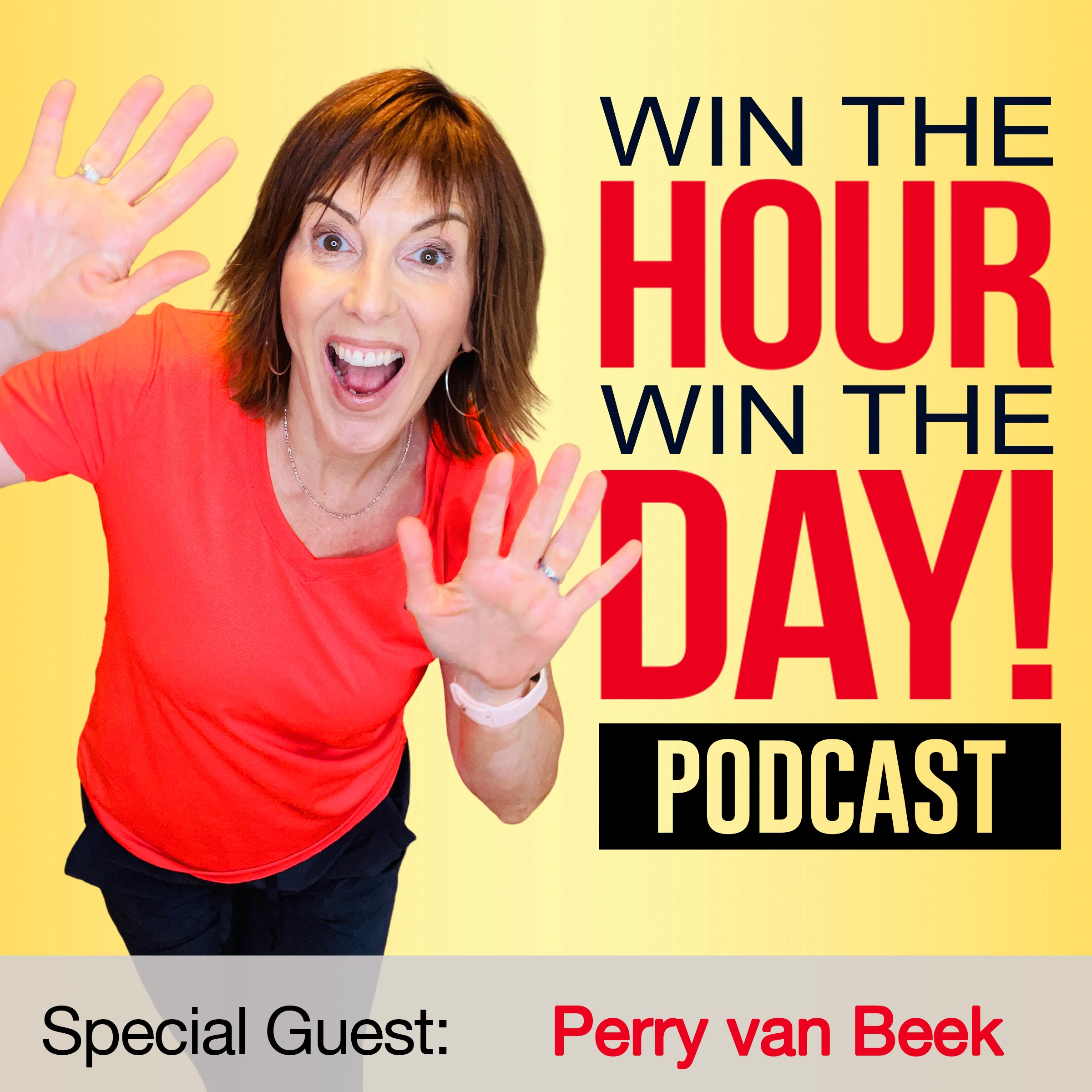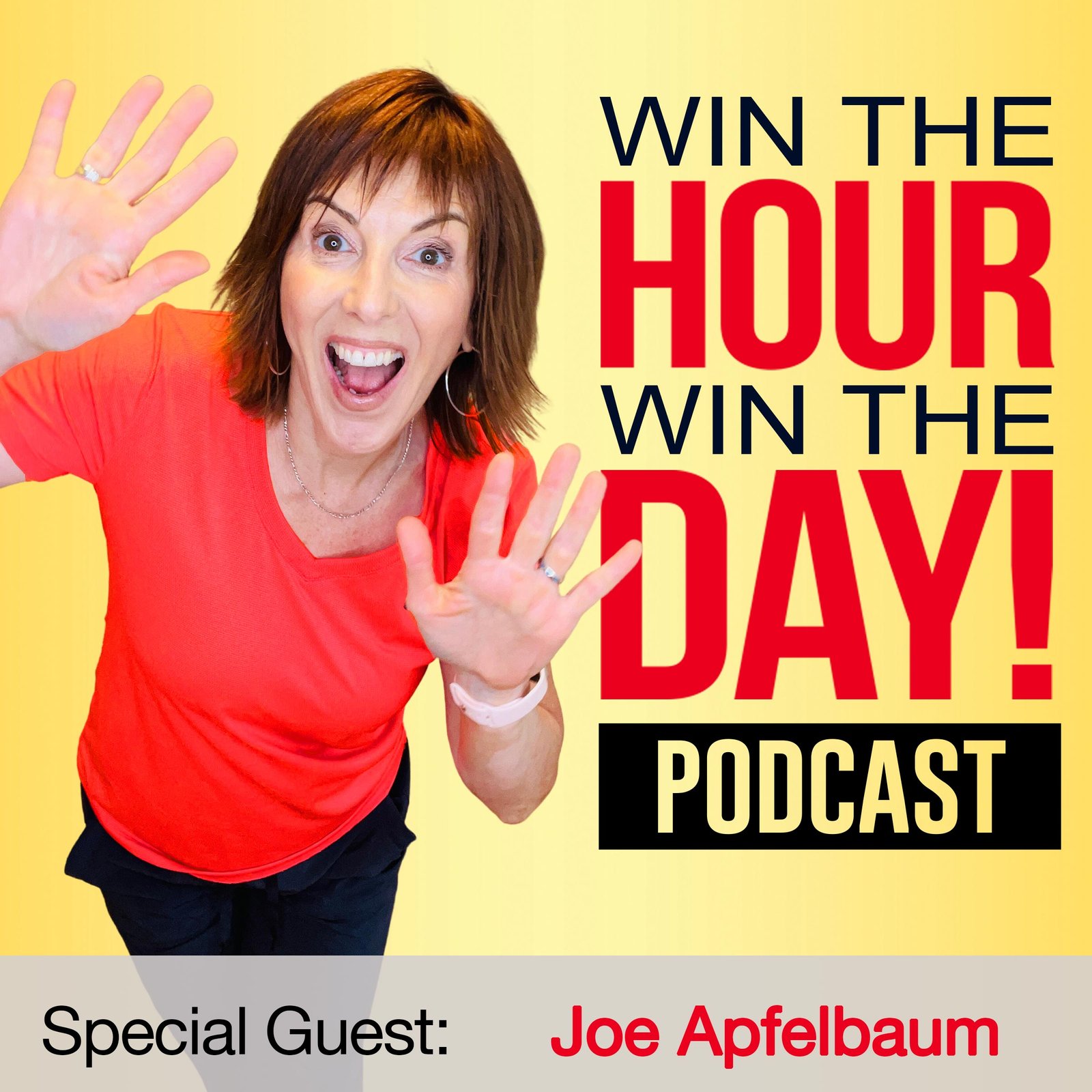Episode Summary This week’s episode of Win The Hour, Win The Day Podcast interviews,...

Are You Ready For Your Next Big Win?
Know your entrepreneur personality and I’ll take it from there!
Recent Podcast Episodes
Slow Down to Speed Up: Repurpose Video Content with Jeff Sieh
Episode Summary This week’s episode of Win The Hour, Win The Day Podcast interviews,...
Virtual Assistant Hiring Secrets: Leadership that Drives Success! with Wally Malaque
Episode Summary This week’s episode of Win The Hour, Win The Day Podcast interviews,...
Boost Your SEO: Leveraging Pinterest as a Powerful Search Engine! with Meagan Williamson
Episode Summary This week’s episode of Win The Hour, Win The Day Podcast interviews,...
Transform LinkedIn Posts into Binge-Worthy Stories with David Young!
Episode Summary This week’s episode of Win The Hour, Win The Day Podcast interviews,...
Leading Virtual Teams: Angelene Balansag on Empowering Workspaces
Episode Summary This week’s episode of Win The Hour, Win The Day Podcast interviews,...
Unlock Virtual Event Success: Michael Tucker’s Expert Strategies
Episode Summary This week’s episode of Win The Hour, Win The Day Podcast interviews,...
Power Your Podcast: Key Guesting and Marketing Tips! with Kamie Lehmann
Episode Summary This week’s episode of Win The Hour, Win The Day Podcast interviews,...
Unlock LinkedIn Success: Harness Sales Navigator Today! with Perry van Beek
Episode Summary This week’s episode of Win The Hour, Win The Day Podcast interviews,...
Boost Your LinkedIn Impact with Video Communication Tips! with Troy Hipolito
Episode Summary This week’s episode of Win The Hour, Win The Day Podcast interviews,...
Master Communication and Power Persuasion Skills with David Tyler
Episode Summary This week’s episode of Win The Hour, Win The Day Podcast interviews,...
The Power of Storytelling: Master Video Branding with Elin Giczi
Episode Summary This week’s episode of Win The Hour, Win The Day Podcast is...
Selling Sincerely: Blake Binns on Real Connections in Sales
Episode Summary This week’s episode of Win The Hour, Win The Day Podcast is...
Preventing Burnout with Smart Work Tools! with Kris Ward
Episode Summary This week’s episode of Win The Hour, Win The Day Podcast is...
Master Social Selling: Heidi Medina’s Strategies for Engagement
Episode Summary This week’s episode of Win The Hour, Win The Day Podcast is...
Boost Productivity and Master Storytelling! with AmondaRose Igoe
Episode Summary This week’s episode of Win The Hour, Win The Day Podcast is...
Master Video Marketing: Top Tips for Entrepreneurs with Dan Bennett
Episode Summary This week’s episode of Win The Hour, Win The Day Podcast is...
Boost Your LinkedIn Strategy with AI Tools for Enhanced Productivity! with Joe Apfelbaum
Episode Summary This week’s episode of Win The Hour, Win The Day Podcast is...
Mastering Personal Branding with NLP Techniques! with Olesija Saue
Episode Summary This week’s episode of Win The Hour, Win The Day Podcast is...
Innovative Lead Generation and Email Automation Secrets with Jennie Wright
Episode Summary This week’s episode of Win The Hour, Win The Day Podcast is...
PR Strategies for Diverse Entrepreneurial Impact! with Jennifer Singh
Episode Summary This week’s episode of Win The Hour, Win The Day Podcast is...
Convert More Clients on LinkedIn with Richard Moore
Episode Summary This week’s episode of Win The Hour, Win The Day Podcast is...
Master Business Growth on Pinterest with Meagan Williamson
Episode Summary This week’s episode of Win The Hour, Win The Day Podcast is...
24/7 Sales Boost: Video Marketing Secrets with Alex Sheridan
Episode Summary This week’s episode of Win The Hour, Win The Day Podcast is...
Master Public Speaking Tips with Nausheen Chen!
Episode Summary This week’s episode of Win The Hour, Win The Day Podcast is...
How To Get In Front Of Prospects With Your Content! With Dan Janal
Episode Summary
Dan Janal is all about elevating yourself above your competition. He wants you to set yourself apart from the rest. Join us as we dive into:
How to:
-get more coaching clients through content
-be the solution to your prospects problems
-position you as the person who can lead them from mess to success
Join The Community: https://www.facebook.com/groups/WinTheHourWinTheDay/
Win The Hour, Win The Day! www.winthehourwintheday.com
Podcast: Win The Hour, Win The Day Podcast
Facebook: https://www.facebook.com/winthehourwintheday/
LinkedIn: https://www.linkedin.com/company/win-the-hour-win-the-day-podcast
You can find Dan Janal at:
Website: https://www.writeyourbookinaflash.com/
Facebook: https://www.facebook.com/prleads/
Email: daniel@prleads.com
LinkedIn: https://www.linkedin.com/in/danjanal/
Check out the Outsourcing Playbook For Busy Entrepreneurs here: https://winthehourwintheday.com/outsourcing-playbook
Dan Janal Podcast Transcription
[00:06:46] Kris Ward: Hey everyone, welcome to another episode of win the hour, win the day. And I am your host, Chris ward, and today in the house, we have the Mr. Dan Jen now. Okay. Dan works with business owners who want to elevate through reputations and set themselves apart from their competition. By writing a book and as a book, coach development editor, ghost writer, Dan shakes, stories and strategies that can transform a career or business.
[00:07:10] Dan has written more than a dozen books have been translated into six languages. His latest book is write your book in a flash. Well, that sounds like a plan. Yeah. So also the host of write your book in a flash with Dan Janell, his own podcast, which I’ve had the thrill and the luxury of being on. So that was fantastic.
[00:07:27] Welcome to the show, Dan.
[00:07:30] Dan Janal: Thanks, Chris. It’s great to be here. I can’t wait to share great ideas with your
[00:07:34] Kris Ward: audience. We love great ideas. They’re very appreciative. They’re very kind with their reviews. They love great ideas. Okay. So Dan, what like your first grade idea, I guess, would be write a book. If you have a business, if you’re entrepreneur.
[00:07:47] Write a book. Would that be your, your belief system on that
[00:07:51] Dan Janal: one? It is, but people don’t want to hear a belief system. They want to hear a story. So I’ll tell you the story about how I realized I needed to write a book. You know, so we were talking in the green room. My background was in high-tech PR. I was responsible for introducing the introducing the CD rom to the entire world.
[00:08:08] I was on the PR team that launched America online. I had incredible credentials. So what was my marketing? My marketing was going to conferences and speaking and teaching and being on panels. And. Frankly. So it was all or my other competitorsASSASAAAAAAAAAAAAAAAAASASSSSSSAa PR and I’d say, that’s great.
[00:08:29] Uh, when do we start? And they said, well, why don’t you send us a proposal first? And I said, okay, so I’d spend the next 10, 20, 30 hours of my life writing a proposal. Has that happened to you? Anyone listening here? Yeah. So you write a proposal, you send it off. And what do you hear? Crickets. Absolute crickets.
[00:08:45] Why? Because they want to, all of my competitors, they asked them for proposals, they spent enough the same 10, 20 hours writing proposals. And the client says, well, we’re not going to do anything or we’ll have our secretary implement these things. They can’t be that hard to do. And we’d all walk away with nothing.
[00:08:59] I feel like this can’t go on this way. I have to have something that separates me from everyone else, because like, let’s, let’s face it. You know, we all had, we were all good people. We all were honorable people. We all did good things. We all have good credentials. Just like I’m sure many people in your audience were saying, yeah, I sell insurance or I’m a dentist.
[00:09:15] I’m a realtor. And I’m really at the top of my game competitors. Um, so what do we do to stand out? So I thought, well, why don’t I write a book? So I wrote a book called how to publicize high-tech products and services, and I self-published it. And I brought it to the next conference I was at. And people came up to me afterwards after my speech.
[00:09:33] And, uh, they said, we’d like you to do RPR. And I said, Oh, do you want me to write a proposal? And they said, nah, you wrote the book. We know, you know what, you know, we want you to start right away. And that’s when I realized that the book is what can separate you from everyone of your competitors in your local market, whether you’re a dentist or a lawyer or an info marketer on the internet.
[00:09:57] If you have a book, you stand out from everyone else, that’s why you need a book.
[00:10:01] Kris Ward: You really do. And I think for me, It really was, you know, somebody said to me, very wisely being in business is not enough, right? So let’s say you, you want to be on a podcast. You want to be doing something. You want to get your message out there.
[00:10:15] You want an opportunity to be in front of somebody else’s audience. And so why? Oh, I’m really good at this. Well, you know, as my PR coach said to me, once being in business is not enough, like, what do you got? What’s new and, and you kind of. You know, can take offense at first. Like, no, no, I do this differently, but it’s kind of like when you even watch, like, I don’t know what late night show or something was celebrity on it.
[00:10:38] They’re only on it to pitch a movie they’re only on it because they’ve got something new. So having said that you can also, you don’t need a new book every year. You can get a lot of juice out of one book, but it really does give people a reason to stop and listen and an opportunity to engage with you.
[00:10:55] It’s been my experience,
[00:10:56] Dan Janal: anyhow. Yeah, it really does. It does set you apart, but you touched on something really interesting in your comment there that it lets people know how you work. One of my good friends is Alexander walk-ins. She’s a naming specialist. She names companies, she names, products. You’ve heard of the Baconator from Wendy’s.
[00:11:12] Or he goes to Wendy’s or burger King. She created the Baconator. She creates companies and products like spoon me. So yogurt company in Utah, spoon me get it. She hasn’t made a product called kiss my face. And so lip balm, you know, what is the benefit of a lip balm? You won’t be able to kiss your face. Now it’s on every supermarket that I go to amazing spot.
[00:11:33] So she wrote a book that talks about her. Are processed are naming companies. And you can tell she doesn’t name companies with, you know, crazy Latin or Greek names like AstraZeneca or Zilo Tron or probes stack or whatever. That’s not her style. So she’d be wasting a lot of her time talking to drug companies or people who said, well, we want to see, we want a name.
[00:11:56] That’s hard to pronounce it, impossible to spell. That’s not hard. She uses what she calls the smile method. And I forget what the S stands for in the M and the eye. But it’s our way of working. And, you know, she repels the people who she doesn’t want to work with and she attracts the people she does want to work with.
[00:12:14] So when you write a book, if you talk about your process, you’re very likely to attract the kind of people who are going to be your perfect lines. And not waste time with people that you’re just going to butt heads with. That’s another reason to have to
[00:12:27] Kris Ward: write a book that is a good point. And I do forget that cause, and then also people when they’ve written the book and they reach out to me, they feel like they already know me because I have shared my insight, my process, and it really does have an impact.
[00:12:40] So it really is a FA I’ve really enjoyed the journey. And I’m actually really eager to start my second book in the series. So let’s talk about that. Where do they store it? How do you write a book? Cause I’ll tell you there was a few moments now I want to do the next one. Very, very different. I was on my own.
[00:12:57] I learned all by myself. There was a few moments I remember saying to Evan on my team. Okay. Evan, if anything happens to me, you got to finish this book because I was sure it was never going to get done. And it reminded me of, do you remember on Sesame street? Kermit, the frog was talking to this guy who was doing crew with the frog reporting and he was talking to guy smiling and he’s playing the piano.
[00:13:17] Mary had a little Mary had little and he kept crying. I don’t know the end of the song. And Kermit started to help him. And that’s how I felt like when I was writing, going, I don’t think I’m going to get this right. But I did in my book, I made a thousand mistakes. The first time I will do it very differently.
[00:13:35] It’s really, truly not hard to do, but I have. Of course did it the hard way the first time. So let’s save our listeners that save you guys some pain points. So you’re crying over your keyboard. Like I was, what are some tips, Stan? Where do we start?
[00:13:50] Dan Janal: Cool. I’m glad you asked that because when I work with my clients as a developmental editor and a book coach, that’s exactly where we start and I ask them four questions to really get them focused.
[00:14:00] And the first one is, what do you want the book to do for you? Okay. So this is really Stephen Covey, you know, begin with the end in mind. So if you want more coaching clients, if you want more prospects, if you want people to, when people write the books and they don’t know what they want the book to do, um, and then.
[00:14:17] You have to figure out who your ideal client is and what their key bend their key pain is that you’re solving. Because frankly, the only reason anyone will read a book is to solve their problems. So they don’t want to read wonderful stories about how you save the world. They want to read about how you helped people, just like them overcome their problems.
[00:14:38] So I like to say, you know, who’s your ideal client because you know, sometimes I had one client. Who said, you know, my ideal classroom, they’re really three ideal clients. That’s what most people say. I have a couple of ideal clients. And once she was a business coach for women, and she said, I really like working with women who are just graduated from college because they need so much help.
[00:14:57] They, they know nothing about the world and they need so much help and I love helping them. And I said, who else do you work with? I said, well, I really like working with pink collar worker women because, uh, they, they need the confidence and need the, to, to get to the next level. And they’re afraid to ask for raises.
[00:15:12] Kris Ward: Interrupt you for a second, Dan? I think you’re hitting your microphone. There’s a tapping. Just be mindful of that. Sorry. I think we’re good. Sorry, I didn’t want to interrupt your flow. My apologies there. I just heard it again. I think you tapped it. I’m not doing anything. Okay. No worries. Okay, just hit it again.
[00:15:33] Am I hitting it now? Hold on.
[00:15:38] Yeah, that was the noise. Okay.
[00:15:40] Dan Janal: I think I must be touching the desk.
[00:15:42] Kris Ward: Yes. Okay. So what we’re going to do, I’m going to make a note here, edit. Cause I was torn up. Is it annoying enough that they’ll hear it or do I stop? You ruin the flow. Okay. So you’re hitting the desk. So we’ll start with the pink collar workers.
[00:15:56] So let’s start there. So, uh, Ruby, when you’re hearing this, you’re going to go back just where he started the pink collar worker, antique, this chocolate. Okay, go ahead.
[00:16:05] Dan Janal: The next group that she likes to work with were pink collar workers, because those women needed help with negotiating skills and confidence or whatever.
[00:16:13] And I said, great. Who else do you like to work with? And she said, women in the C-suite who wants to get to the boardroom? I figured. Oh, that’s really great. So let me ask you another question who, so the first question of course, was who do you like to work with? The second question is who has the money to pay you?
[00:16:28] I just know very clearly it’s the women in the C suite, uh, said, okay, great. Then why don’t you work with the women in the C suite and charge them what you charge them and then do pro bono work for the other ones because they don’t have the money to pay you or the confidence to pay you or see the need for coaching, whereas the C-suite women do.
[00:16:48] So what does this mean for the people listening? Very clearly. You have people and prospects who you love to work with. You have probably have some clients that you wish you never signed. Write the book for the people you want to work with and also using the skillset that you want to work with. I mean, I’ve burnt out of a lot of ideas and a lot of, uh, and I’m sure you have as well, like you probably don’t go into people’s homes and.
[00:17:12] Reorganize their closets anymore. If you did, you’re working at a much higher level now. So you want to repel the people who want you to come in and remodel their garage, so to speak. Uh, so think about the skills that you want to work with, that you have fun with, with the people you have fun with, who can afford to pay you, that’s your avatar, you know?
[00:17:30] Kris Ward: Okay. That’s a really good point. And when unpack that for a second, because. It’s so easy and tempting to say, okay, this is my area of expertise. And so then you’re writing from your position of, I just want to write and show people kind of like a school essay. I want to show you what I know, but we have to remember, it’s not about you.
[00:17:50] We want the right person to read the right story, the right book, the right answer. So this sounds as you roll it out, it makes so much sense. But I bet ya Boyle boy, a lot of people overlook it. I mean, I was really lucky because mine was based on experience with clients and I needed to serve more and more people.
[00:18:07] So it morphed into a book so that I could have a bigger impact, but to jump up and say, I want to write a book and you know, whatever, I’m a marketing coach. You can’t just say, okay, here’s the six biggest mistakes in marketing. You have to say, okay, who do I want to read this as a pre-qualifier. To engage them and then warm them up as a really solid lead.
[00:18:30] And also the same then to get on podcasts. You want to be talking about this book for a good year or two. So you want the right people listening to that. Right. Okay. That’s very simple, but hugely profound in that makes that’s a really important point.
[00:18:44] Dan Janal: Very cool. Yes. And then show the people how they will be transformed.
[00:18:49] What do you want them to be and feel after they’ve read your book? Uh, so that, that helps with your marketing copy as well. It also helps you picture who they are. I mean, one of my clients right now is writing a communications work for programmers. Who have trouble communicating with people and getting their points across.
[00:19:09] So I said, who is your ideal client? And I gave him these kinds of prompts and he came back with Raj from the big bang theory. You know, the person who couldn’t speak to women unless he was drunk and, you know, bingo. He had his avatar, his character right there. So he printed out the picture, put it next to his monitor.
[00:19:26] I knew immediately who he was writing for, and that will help you because you’re writing for that one person. So I think those ideas will help you get really focused on who that person is, what problems they have and the skillsets and the answers you can bring that will help them. So the book will.
[00:19:43] Position you as the person who can lead them from mess to success and also position you. So they get to like, get to know like, and trust you. That’s the purpose
[00:19:52] Kris Ward: of that. And that’s, uh, you know, again, you can’t drive that home enough because it’s really easy to get down a rabbit hole and you start to explain one thing and the problem is.
[00:20:00] You know, you have to remember, you’re not speaking to your peers. And we often do that when we’re writing copy or educating somebody. Cause then you feel like, Oh, I have to explain this and that this and that. That’s, you know, we, we need to trim it down really and make it digestible and an easy read, which I will tell you, writing easy to read book is not.
[00:20:19] I learned that the hard way when I, when I wrote my book the first time. What happened is my background is a marketer. I was writing it in a marketing tone and a marketing tone is a little bit more aggressive, a little bit more in your face of short, powerful messages of this is your problem. And what was happening is my book is divided into two sections, a struggle.
[00:20:40] If you’re a struggler or a successful person, right? How you run your business team building. And it has nothing to do with money, a successful person, you know, has freedom of the business run by itself. All kinds of things in a struggler is. Always trying to catch up and you know what, if you’re not in the business, it’s just not moving.
[00:20:54] Right? So this definition a little bit more detailed than the book. And it’s told with stories and stuff like that, what was happening is I put all the strugglers chapters up instead of divided each chapter into two, I put all this drug structure stuff up front, and then the successful person at the end.
[00:21:09] And I just thought like, Oh, I’ll get my mom to read it a few close friends, just to see what they think. And it was really helpful and interesting on a couple levels because one, um, they came back and nicely told me it was painful. It was just too many problems upfront with not enough solution. Like, yeah.
[00:21:26] Yeah. Okay. Here’s all the problems, but I I’m so beat up and we’ll get to the solution, which has happened through the book. And I defensive me for a split second say, well, you don’t understand. You’re not my ideal client. And I just wrote a whole gosh, darn book. So find something positive to say, but I sucked it up really quickly and I can hear myself.
[00:21:50] Cause I was about to say that to these people say, well, you don’t understand. You’re not ideal client. If you don’t understand. And I have to explain it, then that’s a problem. Right? Any, anybody should be able to read your book if you write a book? Well, unless it’s some highly academic specific niche scientific thing, you write a book.
[00:22:08] Well, that’s the exciting part of a book is it will bring you into a land that you didn’t. You know, I read a book once. Oh my gosh. I had no idea. I thought when you climbed up. Now Evers. I thought it was a weekend thing. It was like a Sunday. I knew it was April. I knew you could die. I knew all these things, but somebody gave me this book and I was like, what?
[00:22:28] This takes months. And it was so much more involved than I understood. And I was like, well, I learned something here. Not that it was ever going to be something I needed to know, but for me that was really huge. It was like, Oh, okay. So they don’t get it. So back to the drawing board, I repurposed it and did it all.
[00:22:43] So that’s really something that I think everyone should know is. You just really want it to be inviting and easy and anyone should be able to digest it. That’s my opinion.
[00:22:54] Dan Janal: Exactly. You know, no one wants to read the entire encyclopedia about their topic. Uh, they want to get on a plane in Montreal and finish it by the time they get off the plane in Vancouver.
[00:23:05] So books say are much shorter than ever before because people have shorter attention spans, which frankly, as a. As a business owner makes it a lot easier for you to write a book. We’re talking about a book that has maybe 20,000 to 25,000 words. It’s about 120, 120 540 pages or so. So if you break it down into 10 chapters, I love doing that because the math is a lot easier.
[00:23:27] If you divide by 10. Yeah. We’re talking about 2000 words per chapter or 2,500 words per chapter, you can write that easily. It’s like a blog post blog posts are about 250 or 500 words. So you sit down, you write a couple of blogs that make it too easy, but, uh, you use that kind of analogy. You can write a thousand words a day.
[00:23:47] You’ll have a book done in 20 days. It could be that simple if you’re focused and if you know what you’re. Client’s problems have and what you want to solve, then you’re just knocking off those problems and writing the chapters that solve those problems.
[00:24:01] Kris Ward: And I would add Dan, one of the things I’m so glad that I didn’t do is I didn’t take any shortcuts.
[00:24:09] And it was really hard when I was writing the book when I said, okay, like I had people read it the first time to find glaring, typos and stuff, like totally junk. Right. And also because I want a feedback. Because when I did pay for an accomplished editor to read it, she will edit the grammar. And she’s not going to tell you that your book is painful to read and that it’s, you know, she’s not, that’s not her job.
[00:24:29] She’s not going to give me an opinion on it, but it was, you know, it was hard when you’re like, okay, I didn’t cheap out on the cover. I didn’t cheap out on the editor and then you’re spending his money. Oh my gosh. I hope one person creates it. I’m spending all this money, but when it goes out, I stand very proudly now holding my book because people always comment on the cover and the little sketches inside.
[00:24:52] They love the pictures. And of course, you know, the editing was done spectacular. I mean, you don’t want these things going out and then there’s the stakes and typos and bad because listen, here’s what I’ll tell you. Even if you thought you could edit your own book, which I guarantee you can. But even when I was reading my book, what happens is you have to reread your book so many times that you think, huh?
[00:25:14] Did I say that in chapter two and four? Or did I read that the last time I read my book? Right? So then you get confused. You don’t know where it begins and ends. So I would tell you, uh, everyone out there is you don’t want to be cheap with it either because it, it really pays it’s when you get it out there, you really want it to be an accomplished, put together book.
[00:25:38] You want it to look like a book? You don’t want it to look like a homemade thing that you and your kids worked on in the kitchen.
[00:25:44] Dan Janal: Exactly. You, you bring up, uh, you used the word editor and I want to just expand on that. Unpack that a little bit. There are three kinds of editors. There’s the developmental editor, there’s the copywriter and there’s the proofreader.
[00:25:55] And the best way I can explain that is like, imagine you’re in the green room of a television studio about to go on, uh, On a, on an interview show and I’m sure many people have not done that, but you’ve seen movies where people are sitting in the makeup chair and someone comes along, puts down the foundation and make sure that there are no wrinkles and no gray hairs and all that good stuff.
[00:26:15] You know, that’s the copywriter. They’re making sure that your book looks good, has no obvious errors and such. And then a minute or two before, you’re about to go on. Someone else comes along and wipes off the little perspiration around your you’re far ahead and all that. That’s the proofreader. They’re making sure that all the periods in the right place and there you have curly quotes throughout and not straight quotes and all that stuff.
[00:26:36] But as you’re walking to the cameras and walking to the set, and you’re looking at the host and you say yourself, what the hell am I going to say? That’s where the developmental editor comes in. That’s what I do. And, uh, you brought up a couple of yeah. Point, you know, did I tell that story? Three times I actually had a client who told the same story three times in three different chapters.
[00:26:55] And he didn’t realize it that same client would tell a story. And he’d say, this story shows a honor. Well, it didn’t show on, or it showed employee engagement. It’s like, look, good story, wrong section. Let’s just move it to the right chapter. So I work with clients like that to make sure that the points they want to make are actually making, because if you can’t see the forest for the trees, you know, Willie Jolley has a, has a saying that goes like, if you’re in the front, Picture you can’t see the frame.
[00:27:22] Yeah. And, uh, you need someone to see the big picture and I’m doing that now with one of my clients. Who’s basically, he’s written two books in one and we have to take off everything that is not okay. Speaking out to his ideal client that will get him the ideal customers, but he had to get to that point.
[00:27:40] He had to excise all those stories from himself. He’s sort of like, I want to write a memoir, but I also want to help these other people. Well, okay. You can either do one or both, but you can’t put them into the same thing. This is not Reese’s peanut butter cups. You know, the chocolate and the peanut butter work in candy.
[00:27:55] They two ideas do not work. Two conflicting ideas do not work. In the same book. So that’s what a developmental ledger does, you know, they have your back, they make sure the book is as good as you can possibly make it.
[00:28:07] Kris Ward: Yeah. And it really is quite a powerful tool. Uh, and it doesn’t need to be such a hard journey.
[00:28:12] And I did have, I didn’t have a Dell developmental editor, which I, you know, which would have been helpful. I didn’t know you back then, that would have been helpful. And I did have, I don’t know if the other editor laying out the book, how it’s laid out and stuff. So I did have that again. I didn’t take what.
[00:28:27] But you know what? I will tell you, Dan, it, somebody working with you, it would have been phenomenal because when I looked at the sky and said, okay, I need an editor. I didn’t even know what that’s called. Is it a book editor? Do I look under the yellow pages with John exist anymore? Like, I didn’t even know.
[00:28:43] Where do we find these editors? You don’t just want to put something up on Facebook. I’m looking for editor. Well, how do I know when this is a good editor? I did have to go through a couple before I figured out when I was what qualifies somebody as a good editor. So it really is helpful to have someone like you with a roadmap, because I didn’t even know.
[00:29:02] You know, I didn’t even know what I was looking for. I didn’t know. It was like walking into a furniture store and they renamed everything. I didn’t know if I was looking for, is a chair, a chair, or am I looking for a table or bed? I don’t know what, I don’t know what I’m doing. Right. So it really would’ve made the process a heck of a lot smoother and easier and quicker had I had somebody guiding me.
[00:29:20] So that is a really good point. All right, we’ve got a minute or two left. What’s the, you know, something you just don’t want to leave here without telling everyone. Well, uh,
[00:29:30] Dan Janal: getting back to the idea of developmental editing. I do work with a lot of people. Who’ve actually written first ramps and don’t know where to go, or they’d started the book.
[00:29:37] They don’t know where to take it. And that’s where a developmental editor like me can come in and say, okay, this works, this doesn’t work. And here’s how to fix it. And then you have a partner who can show you what to do. In fact, it’s almost like taking a writing course. So I was like, just the millennials are like, I felt like I got a whole writing course, but I’m learning how to write a book.
[00:29:55] But the key message I want to leave people with is that your stories will make your book different. Everyone who comes to me says, why should I write a book? Because there’s so many other books now in sales or leadership or management or this or that, or the other thing, what will make my book different?
[00:30:09] Well, it’s you. You make your book different, your stories, your insights, your perspective. That’s what makes the book different. So you should definitely write a book, even if there are thousands of other books on the market, because frankly your clients are not going to see those books. They’re going to see the book that you put into their hands, which is your book that shows them that they get to know like, and trust you and see you as a leader who can take them from MIS to success.
[00:30:33] So they want to hire you.
[00:30:34] Kris Ward: Yeah. And I just want to add to that, Dan, that’s a really good point because I know for me, I had somebody a couple of times I said, I should write this book. And I was thinking some reason, I don’t know why I thought, well, 10 years from now, when I ha I don’t know this, this accomplishment or, or need this certain amount of money.
[00:30:50] I don’t know. I thought there had to be some knighting of me. Like somebody put a sword on my head and then be still that it’s time. I don’t know what, and I was like, well, why could I read a book now? Like what’s happening now? Right. So I didn’t understand that. And you’re right when somebody says, well, why should I read a book?
[00:31:04] Like, let’s say you’re in finance and dissolves finance books. Well, you know, that would be the same as saying, well, why should I be in that career? There’s so many other people in that career, you bring to that career, obviously a different skill set and a different approach, and people are working with you.
[00:31:18] So the same thing is they are going to want to hear your perspective and they will read that book. So it can be intimidating. It took a little mind shift for me in the beginning, but I’ll tell you it’s like potato chips, you can’t stop at one. I’m like, I’ve got to get the second book out because I want it to be a three-part series.
[00:31:34] So now it means I got to get the second book out so I can get the third book out. That’s just one series that I’ve been another students. So, uh, it is well worth. It, it is fun and make your path a lot easier and find, uh, you know, check out Dan and, and reach out to him. Dan, where can they find you? Where’s the best place to be?
[00:31:52] Dan Janal: Well, the name of my book is write your book in a flash. So the website is, write your book in a flash.com. That’s where you can find me, write your book in a flash.com where I have lots of free tools and things you can download and learn more about
[00:32:04] Kris Ward: how to write your book. Fabulous Dan, as always, it’s a pleasure dealing with you.
[00:32:08] Thank you so much. And everyone else we’ll see you on the next episode.





























